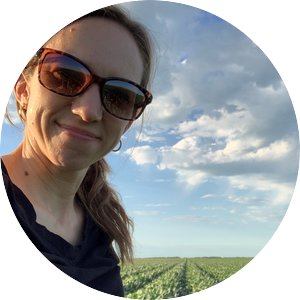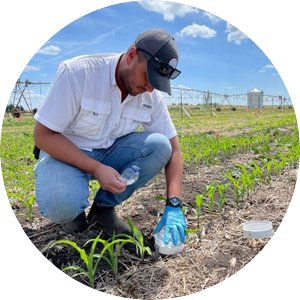Two LAAS graduate students were selected to receive George Rehm Nutrient Management Fellowships, an honor that includes $5,000 of funding. Nancy Bohl Bormann is advised by Melissa Wilson, and Eduardo Garay is advised by Fabián Fernández; both are working toward PhDs in Land and Atmospheric Science. Here they share a bit about what inspires them and their plans for taking their expertise in soil fertility and nutrient management into the world.

Nancy Bohl Bormann is creating a nationwide manure database. When it’s ready to be implemented, this project will be a dynamic, up-to-date resource with contributions from laboratories across the country. Currently, the most common average manure nutrient values (book values) used are almost two decades old. By giving farmers the most current information about manure nutrients, they can make the best decisions for their land and the environment.
This summer she has been reviewing trends in the Manure Analysis Proficiency Program, a nationwide program administered by the Minnesota Department of Agriculture that certifies laboratories for manure testing.
What are you passionate about and why?
I have a passion for the intersection of agriculture and the environment, especially in the areas of nutrient management, soil health, and water quality. As a farmer, being a good steward of the land while being profitable is of utmost importance. Demonstrating that this is possible and having others try new practices is exciting.
What do you aspire to do in the future?
I want to continue to promote more effective conservation science and practices. After graduate school, I would possibly be interested in working in Extension, teaching at the college level, working in industry or government, or being an independent consultant while continuing to be a part of our family grain farming operation.

Eduardo Garay is evaluating cover crops and living mulches as part of a holistic nitrogen management strategy for corn and soybean growers. Minnesota has over 600,000 acres of irrigated sands predominantly used for corn and soybean, which are highly productive but equally vulnerable to nitrate leaching and groundwater contamination. My research aims to develop a holistic nitrogen budget that is beneficial to both the grower and the environment.
What are you passionate about and why?
Soils are an invaluable resource that must be protected and sustainably used in order to have a food secure future. More importantly, this food secure future will only work if we protect the quality of our environmental resources. It truly inspires me to think that through research we have the privilege of learning why things work in a certain way or what we can do differently, to improve for a greater good. I truly believe in the urgent need to find solutions that support farmers because without them we have no food, and with no food we have no future!
What do you aspire to do in the future?
As a native from Honduras I feel extremely humbled and grateful for the opportunity to pursue a PhD. My background constantly reminds me of the “big picture” and how the agri-food sector plays an important role in our lives. Sometimes there is a disconnect between science and regulations, businesses, and policies. Therefore, I would love to have the opportunity to work as a bridge between my technical background and solutions that allow us to make this world a better place
